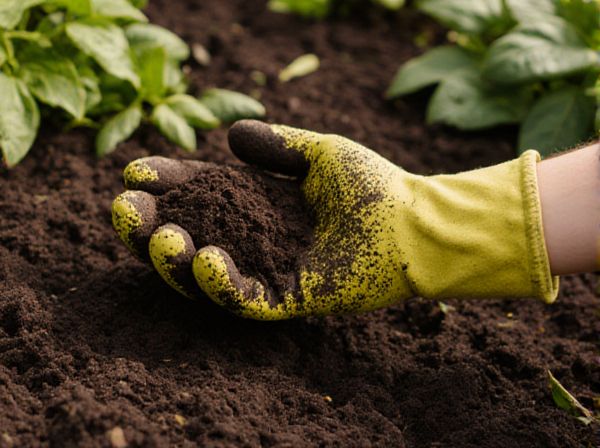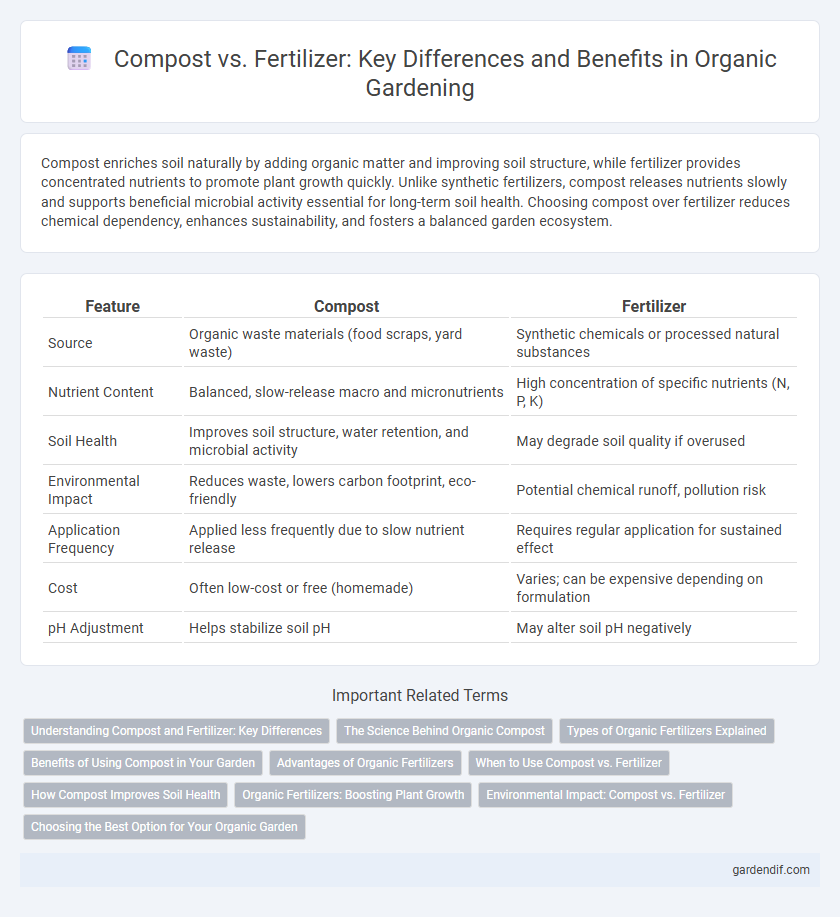
Compost vs Fertilizer Illustration
Compost enriches soil naturally by adding organic matter and improving soil structure, while fertilizer provides concentrated nutrients to promote plant growth quickly. Unlike synthetic fertilizers, compost releases nutrients slowly and supports beneficial microbial activity essential for long-term soil health. Choosing compost over fertilizer reduces chemical dependency, enhances sustainability, and fosters a balanced garden ecosystem.
Table of Comparison
| Feature | Compost | Fertilizer |
|---|---|---|
| Source | Organic waste materials (food scraps, yard waste) | Synthetic chemicals or processed natural substances |
| Nutrient Content | Balanced, slow-release macro and micronutrients | High concentration of specific nutrients (N, P, K) |
| Soil Health | Improves soil structure, water retention, and microbial activity | May degrade soil quality if overused |
| Environmental Impact | Reduces waste, lowers carbon footprint, eco-friendly | Potential chemical runoff, pollution risk |
| Application Frequency | Applied less frequently due to slow nutrient release | Requires regular application for sustained effect |
| Cost | Often low-cost or free (homemade) | Varies; can be expensive depending on formulation |
| pH Adjustment | Helps stabilize soil pH | May alter soil pH negatively |
Understanding Compost and Fertilizer: Key Differences
Compost is a natural organic matter rich in nutrients and beneficial microbes, enhancing soil structure and promoting long-term soil health. Fertilizer provides concentrated nutrients in synthetic or organic forms designed for immediate plant uptake, boosting growth quickly but without improving soil quality. Understanding these differences helps gardeners choose compost for sustainable soil enrichment and fertilizer for targeted nutrient supply.
The Science Behind Organic Compost
Organic compost enhances soil health through microbial activity that breaks down organic matter into nutrient-rich humus. This process increases soil biodiversity, improves structure, and promotes nutrient cycling, making essential minerals like nitrogen, phosphorus, and potassium more available to plants. Unlike synthetic fertilizers, compost supports long-term soil fertility and sustainable plant growth by fostering natural biological processes.
Types of Organic Fertilizers Explained
Organic fertilizers include manure, compost, bone meal, blood meal, and seaweed, each offering unique nutrient profiles to enrich soil naturally. Compost improves soil structure and microbial activity by adding humus and slow-release nutrients. Manure supplies nitrogen and organic matter, while bone meal provides phosphorus for root development, supporting sustainable plant growth without synthetic chemicals.
Benefits of Using Compost in Your Garden
Compost enriches soil with essential nutrients and beneficial microorganisms, improving soil structure and water retention more effectively than chemical fertilizers. It promotes healthy plant growth by releasing nutrients slowly, reducing the risk of nutrient burn common with synthetic fertilizers. Using compost also supports sustainable gardening by recycling organic waste and minimizing environmental impact.
Advantages of Organic Fertilizers
Organic fertilizers improve soil health by enhancing microbial activity and increasing nutrient retention, leading to sustainable crop growth. They release nutrients slowly, reducing the risk of nutrient leaching and environmental pollution while promoting long-term soil fertility. Rich in essential micronutrients, organic fertilizers support diverse plant needs and boost overall ecosystem resilience.
When to Use Compost vs. Fertilizer
Compost is best used during soil preparation to improve soil structure, moisture retention, and microbial activity, making it ideal for long-term soil health. Fertilizer should be applied when plants show nutrient deficiencies or during critical growth stages to provide immediate, targeted nutrients like nitrogen, phosphorus, and potassium. Timing and purpose dictate whether compost or fertilizer is appropriate, with compost enhancing overall soil quality and fertilizer supporting rapid plant growth.
How Compost Improves Soil Health
Compost enhances soil health by increasing organic matter content, which improves soil structure, water retention, and aeration. It fosters beneficial microbial activity that breaks down nutrients into forms readily absorbed by plants, promoting sustainable nutrient cycling. Unlike synthetic fertilizers, compost enriches the soil ecosystem without causing chemical imbalances or pollution.
Organic Fertilizers: Boosting Plant Growth
Organic fertilizers enhance soil health by providing essential nutrients such as nitrogen, phosphorus, and potassium in natural forms that promote microbial activity and improve soil structure. Unlike synthetic fertilizers, organic options release nutrients slowly, ensuring sustained plant growth and reducing the risk of nutrient leaching. This natural nutrient cycling supports stronger root development and increases the overall resilience of plants against pests and diseases.
Environmental Impact: Compost vs. Fertilizer
Compost enhances soil health by increasing microbial activity and reducing the need for chemical inputs, which lowers greenhouse gas emissions and prevents water contamination. Synthetic fertilizers often contribute to nutrient runoff, causing eutrophication in waterways and releasing nitrous oxide, a potent greenhouse gas. Using compost instead of fertilizers promotes sustainable agriculture by recycling organic waste and improving carbon sequestration in soils.
Choosing the Best Option for Your Organic Garden
Compost enriches soil with organic matter and beneficial microbes, improving soil structure and moisture retention, while fertilizer provides specific nutrients for immediate plant uptake. Choosing compost supports sustainable gardening by enhancing long-term soil health and reducing chemical inputs, whereas organic fertilizers offer targeted nutrition to address nutrient deficiencies. For the best results in an organic garden, integrating compost to build soil fertility with occasional use of organic fertilizers ensures balanced growth and promotes eco-friendly practices.
Compost vs Fertilizer Infographic

 gardendif.com
gardendif.com